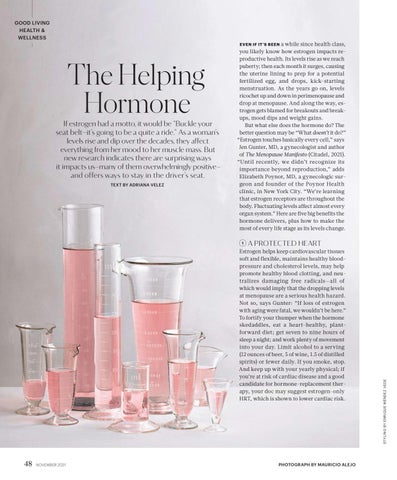GOOD LIVING HEALTH & WELLNESS
a while since health class, you likely know how estrogen impacts reproductive health. Its levels rise as we reach puberty; then each month it surges, causing the uterine lining to prep for a potential fertilized egg, and drops, kick-starting menstruation. As the years go on, levels ricochet up and down in perimenopause and drop at menopause. And along the way, estrogen gets blamed for breakouts and breakups, mood dips and weight gains. But what else does the hormone do? The better question may be “What doesn’t it do?” “Estrogen touches basically every cell,” says Jen Gunter, MD, a gynecologist and author of The Menopause Manifesto (Citadel, 2021). “Until recently, we didn’t recognize its importance beyond reproduction,” adds Elizabeth Poynor, MD, a gynecologic surgeon and founder of the Poynor Health clinic, in New York City. “We’re learning that estrogen receptors are throughout the body. Fluctuating levels affect almost every organ system.” Here are five big benefits the hormone delivers, plus how to make the most of every life stage as its levels change. EVEN IF IT’S BEEN
If estrogen had a motto, it would be “Buckle your seat belt—it’s going to be a quite a ride.” As a woman’s levels rise and dip over the decades, they affect everything from her mood to her muscle mass. But new research indicates there are surprising ways it impacts us—many of them overwhelmingly positive— and offers ways to stay in the driver’s seat. TEXT BY ADRIANA VELEZ
1
A PROTECTED HEART
Estrogen helps keep cardiovascular tissues soft and flexible, maintains healthy bloodpressure and cholesterol levels, may help promote healthy blood clotting, and neutralizes damaging free radicals—all of which would imply that the dropping levels at menopause are a serious health hazard. Not so, says Gunter: “If loss of estrogen with aging were fatal, we wouldn’t be here.” To fortify your thumper when the hormone skedaddles, eat a heart-healthy, plantforward diet; get seven to nine hours of sleep a night; and work plenty of movement into your day. Limit alcohol to a serving (12 ounces of beer, 5 of wine, 1.5 of distilled spirits) or fewer daily. If you smoke, stop. And keep up with your yearly physical; if you’re at risk of cardiac disease and a good candidate for hormone-replacement therapy, your doc may suggest estrogen-only HRT, which is shown to lower cardiac risk.
48
NOVEMBER 2021
PHOTOGRAPH BY MAURICIO ALEJO
ST YLING BY ENRIQUE MÉNDE Z VEDE
The Helping Hormone







